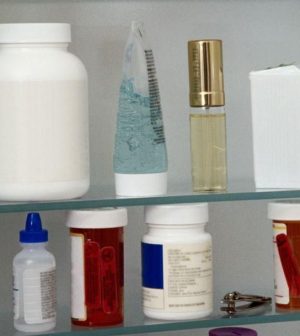- 10 Strategies to Overcome Insomnia
- Could Artificial Sweeteners Be Aging the Brain Faster?
- Techniques for Soothing Your Nervous System
- Does the Water in Your House Smell Funny? Here’s Why
- Can a Daily Dose of Apple Cider Vinegar Actually Aid Weight Loss?
- 6 Health Beverages That Can Actually Spike Your Blood Sugar
- Treatment Options for Social Anxiety Disorder
- Understanding the Connection Between Anxiety and Depression
- How Daily Prunes Can Influence Cholesterol and Inflammation
- When to Take B12 for Better Absorption and Energy
Kids’ Accidental Poisonings Are on the Rise: Protect Your Child

MONDAY, Sept. 6, 2021 (HealthDay News) – As the COVID-19 pandemic grinds on and stress on families mounts, more kids are falling victim to accidental poisoning.
Experts attribute the surge to disrupted sleep patterns, work schedules and parenting routines.
“I think what’s happening is, parents are challenged with a couple of things,” said Helen Arbogast, manager of the Injury Prevention Program at Children’s Hospital Los Angeles. “One is working from home, so they may be incredibly distracted and leave things around that they ordinarily use. And I also think we can’t underestimate the impact of the stress caused by the pandemic. Medical marijuana is one of the strategies people use to alleviate some of that.”
The hospital, which typically sees one or two poisoning cases a week, saw that double in the second half of 2020. Edible marijuana and prescription meds are the most common ingested substances.
To keep kids safe, Arbogast suggests parents and caregivers start by making sure medications are locked up and out of reach. Keep them in the childproof container supplied by the pharmacy, she urged, and not in a Sunday-through-Saturday pill box, which can be easy for a child to open.
If pills have expired, dispose of them responsibly.
The U.S. Food and Drug Administration has a primer on safely getting rid of unused meds. The best way with most is to take them to the pharmacy or designated take-back site. Some meds can be placed in household trash and a few can be flushed down the toilet, Arbogast said. The FDA has a list of those.
She said the whole family needs to be educated and on top of safety. While grandparents may be caring for young grandchildren, their home may not be childproofed.
“Now grandma’s doing the work, and it’s been a long time since she’s had a small child,” Arbogast said. “So she doesn’t even think to put her heart medication away.”
Make sure everyone who cares for your child is aware of the potential for poison ingestion. Remind them to put all medications or cannabis away.
Keep the poison control number (800-222-1222) handy. Call it immediately if you suspect your child has swallowed something poisonous. Don’t wait for an adverse reaction to confirm it, because reactions vary by the toxin consumed.
“Some may cause vomiting; some may cause lethargy where the kid is kind of non-responsive; some might cause a stomach illness,” Arbogast said. “If you think they ingested edibles, that’s not going to have the same kind of reaction as prescription medication. We can’t say, ‘If they look like this, do this.'”
Poison Control can help you determine next steps.
“This pandemic is not behind us yet, and families are still trying to figure out what normal is,” Arbogast said. “So, it’s time for us to think about having our children in new environments. We just want them to be thinking about their child’s safety at every destination.”
More information
The U.S. Food and Drug Administration has a list of medicines that are safe to flush down the toilet.
SOURCE: Children’s Hospital of Los Angeles, news release, Aug. 27, 2021
Source: HealthDay
Copyright © 2026 HealthDay. All rights reserved.










